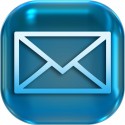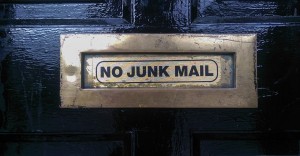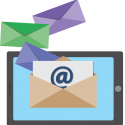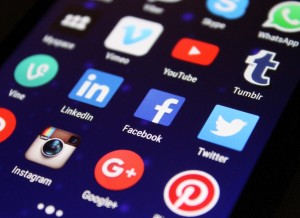 Everyday my email is flooded with a rush of correspondence. There’s a seemingly endless stream of messages all day, every day. Yours, too?
Everyday my email is flooded with a rush of correspondence. There’s a seemingly endless stream of messages all day, every day. Yours, too?
Do you sometimes wonder whether your message disappeared into cyberspace because you did not receive a response? Did they end up in a spam folder? Is no response a “no”? How are the email messages you send handled by recipients who are professionals in the publishing industry?
Is it your email address that could be the problem? If your email is hosted by a company with servers used by spammers there is a possibility your email address is blacklisted by the recipient. If you have never sent an email to a particular address before, there is a chance you will receive a delivery failure notification, or end up in a spam folder. Unsolicited email (a message from someone who has no previous electronic email contact) runs the risk of refusal by the recipient. Once you have been whitelisted by the recipient (by using the reply button to a message they have sent you), you can rest assured your email is being delivered. But how do you know where you email goes?
 You can take steps to make sure your email messages get delivered. Gmail is the most reliable method for business correspondence. Google Business Mail is worth the monthly $10 per user to insure your professional email correspondence works for you. If you’re not sure your message was sent you can always blindcopy yourself when you send it. If you get a delivery failure notification, then you know there is something wrong with your email and the recipient did not get the message.
You can take steps to make sure your email messages get delivered. Gmail is the most reliable method for business correspondence. Google Business Mail is worth the monthly $10 per user to insure your professional email correspondence works for you. If you’re not sure your message was sent you can always blindcopy yourself when you send it. If you get a delivery failure notification, then you know there is something wrong with your email and the recipient did not get the message.
 I am not alone when I say much of what appears in my inbox is “junk.” Like you, I am wary of clicking on links or opening documents from someone I don’t know and trust. The inbox of an agent or editor in the publishing industry is bursting at the seams with computer pirannahs; email senders who suck time and blood into technological whirlpools. One way many professionals in the publishing industry have addressed this email problem for initial contact is through electronic submission forms either on their website or through platforms like Submittable. If you apply for grants and submit to literary magazines you might be familiar with this process. Because email is a primary target for hackers and spammers, recipients of your email may screen to avoid viruses. On initial contact through email, do not include attachments or embed links and your message will more likely be delivered.
I am not alone when I say much of what appears in my inbox is “junk.” Like you, I am wary of clicking on links or opening documents from someone I don’t know and trust. The inbox of an agent or editor in the publishing industry is bursting at the seams with computer pirannahs; email senders who suck time and blood into technological whirlpools. One way many professionals in the publishing industry have addressed this email problem for initial contact is through electronic submission forms either on their website or through platforms like Submittable. If you apply for grants and submit to literary magazines you might be familiar with this process. Because email is a primary target for hackers and spammers, recipients of your email may screen to avoid viruses. On initial contact through email, do not include attachments or embed links and your message will more likely be delivered.
Getting your email delivered doesn’t guarantee your message will be read. More than half of the email messages in my inbox require nothing from me and I delete them. I have them delivered and sorted into folders of priority. Primary. Notifications. Promotions. I scan subject lines and sender names and click all for delete. The email I do need to see flashes at me with green lights at the right intersections of time and place.
What it is about?
When was it sent?
These three factors are the ones I consider when I scan my inbox. How about you?
Here’s my latest understanding of best practices for business emails if you’re working in the world of writers. I’m reminded of these practices as I begin to work with new authors or whenever I run into communication problems with authors, editors, agents, or publishers. Most of the business of being an author is conducted through email and it’s the primary channel of communications. If we don’t have best practices in our communications things can fall apart. I’ve made my share of mistakes and I make a point of asking about personal preferences regarding email. And many of those personal preferences are why I check my email on the weekends and occasionally late at night or very early in the morning.
Tip #1: Send professional emails during normal business hours.
 Do you check your email over the weekend? In the middle of the night? If you do, like I do on occasion, I don’t expect someone who is doing serious business in the publishing industry to email me during Saturday night dinner with a date or during Sunday morning church service. Such emails are sent during business hours. Don’t send an email query letter on a Monday federal holiday. Don’t submit your final manuscript at 3 a.m. to the editor at your publisher even if it is overdue. Be professional about when you send emails.
Do you check your email over the weekend? In the middle of the night? If you do, like I do on occasion, I don’t expect someone who is doing serious business in the publishing industry to email me during Saturday night dinner with a date or during Sunday morning church service. Such emails are sent during business hours. Don’t send an email query letter on a Monday federal holiday. Don’t submit your final manuscript at 3 a.m. to the editor at your publisher even if it is overdue. Be professional about when you send emails.
Most of your business correspondence is conducted by email if you are a professional writer, author, editor, agent, or publisher. Most of your marketing materials are available in digital formats. There is a sensibility that email can be sent at any time because the recipient can read it and  respond at their convenience. However, and it is a big however in this day and age when we carry our cell phones with us so we can respond to emails, it is not appropriate to send emails at 3:01 a.m. At least not if you have not previously made personal arrangements to do so. Sending a query letter or a final draft of a manuscript on the holiday weekend doesn’t make your email correspondence professional because you aren’t observing professional business hours. If your email is passed over for two or three days until the person is back at their desk doing business, it may get buried and lost. And the recipient isn’t going to see it until then anyway, so why the urge to push the send button prematurely? Do you know you can save a draft? Save it and then send it when business resumes on Tuesday morning and they’ll have time to read it and respond.
respond at their convenience. However, and it is a big however in this day and age when we carry our cell phones with us so we can respond to emails, it is not appropriate to send emails at 3:01 a.m. At least not if you have not previously made personal arrangements to do so. Sending a query letter or a final draft of a manuscript on the holiday weekend doesn’t make your email correspondence professional because you aren’t observing professional business hours. If your email is passed over for two or three days until the person is back at their desk doing business, it may get buried and lost. And the recipient isn’t going to see it until then anyway, so why the urge to push the send button prematurely? Do you know you can save a draft? Save it and then send it when business resumes on Tuesday morning and they’ll have time to read it and respond.
Tip #2: The most important thing to write is a good subject line
 The reply button may have been the greatest invention of the early email systems and yet it isn’t nearly as important as the subject line. When you send an email it should be a short message about a single topic. And the subject line becomes the way to organize a stream of emails about the same topic. When the subject changes, change the subject line. Why? When you are searching for an email in your files, you can always find it much more quickly than if you don’t and have to read through hundreds of emails to find what you are looking for when you need it urgently. The lines of conversation on action items is more efficient when organized for the business of being an author.
The reply button may have been the greatest invention of the early email systems and yet it isn’t nearly as important as the subject line. When you send an email it should be a short message about a single topic. And the subject line becomes the way to organize a stream of emails about the same topic. When the subject changes, change the subject line. Why? When you are searching for an email in your files, you can always find it much more quickly than if you don’t and have to read through hundreds of emails to find what you are looking for when you need it urgently. The lines of conversation on action items is more efficient when organized for the business of being an author.
If you are sending out a query letter the subject line is critical. Query, Your Last Name, Working Title of Your Book. If your subject line does not read as such it will get lost in email limbo land.
When you are communicating with an editor or agent, keep your messages short and use those subject lines. Think of the subject line as an action item on your to-do list. Go ahead and hit reply and keep the lines of conversation going but when the subject changes, remember to edit the subject line before you hit send. Use subject lines to help keep the conversation organized and action oriented.
Tip #3: Put your professional signature on all business correspondence including every email message.
 Everyone has their own style, but you need a “signature” file providing contact information at the bottom of every email you send. No need to include a quote or emoticon. Be professional. If you have a website, provide the URL. Twitter handle? Add it. LinkedIn profile? Facebook? Pinterest? Google+ These are signature elements and are optional, depending on your audience, your platform, and your brand as an author. The contact information is always handy and it’s a reach-out to the recipient to connect through other media platforms on the subject of books.
Everyone has their own style, but you need a “signature” file providing contact information at the bottom of every email you send. No need to include a quote or emoticon. Be professional. If you have a website, provide the URL. Twitter handle? Add it. LinkedIn profile? Facebook? Pinterest? Google+ These are signature elements and are optional, depending on your audience, your platform, and your brand as an author. The contact information is always handy and it’s a reach-out to the recipient to connect through other media platforms on the subject of books.
What rules of email etiquette do you practice? What works for you? I encourage you to leave a tip for upping your email game as a writer in the Comments below.

Your comments about emailing during business hours raise a whole bunch of questions for me. What about emailing across time zones? For someone who lives in Europe but has an American publisher, do you think it’s necessary to wait until my afternoon so that the email arrives during American business hours? If I email during my morning, do I risk the chance that the email gets lost in the Americans’ programs because it arrived at 3:00 a.m. their time? Or do you think publishers take that in stride with an international publisher-author relationship?
I never thought about the problem with middle-of-the-night emails until I read your post and realized I’ve been an inadvertent offender. 🙁
Hi Ann. Great question. Emailing across time zones complicates things, doesn’t it? The end of the business day in Germany dovetails with the start of the early start of the business day in New York. For sending a publisher with whom you have already established an email connection, this is of less concern than a query letter on initial contact. If the first impression you make with a recipient is that you are emailing at 3:00 a.m. your message may not be read or taken as seriously. Being cognizant of the recipient’s time zone can increase your chances it gets read, and more importantly, gets a response.
This was a great post, Jill, and it made me aware of issues I hadn’t thought of before. Thanks!